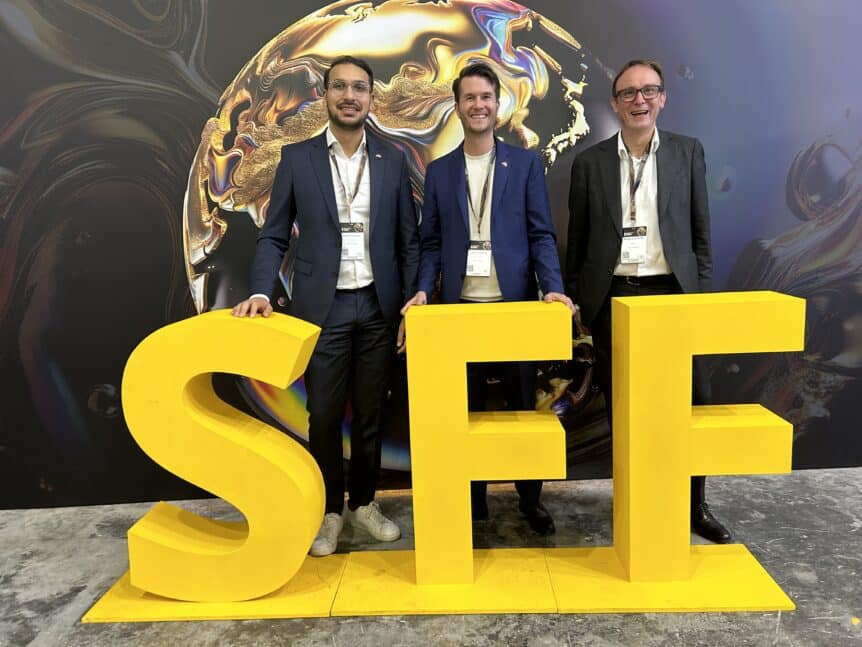One thing is for sure: the future of the capital market will be increasingly digital, efficient and sustainable. The trends and technologies showcased during the SFF week offer banks considerable opportunities, but also – as is so often the case – present them with new challenges.
The focus was primarily on new developments in the area of generative AI (GenAI), DLT and digital assets, current trends in the area of payments and the growing importance of ESG. In this article, we summarize the most important topics and discussions that could influence the future of the banking and finance industry.
Generative AI (GenAI)
The Singapore FinTech Festival 2024 once again highlighted the groundbreaking use cases of GenAI in the financial sector. As the next stage in the development of artificial intelligence, GenAI opens up completely new possibilities for analyzing complex data and developing personalized financial solutions.
The extent to which financial institutions have already tapped into the potential of these technologies is particularly evident in Asia. In the front office, for example in customer support and customer onboarding, GenAI is used to enable highly individualized and efficient customer interactions.
One example is the use of GenAI in prospecting and analyzing both text- and speech-based customer interactions: the first banks are starting to use publicly available information to create precise customer profiles and to predict and increase the probability of concluding a contract based on spoken and written communication.
In the middle and back office, GenAI supports the processing of large amounts of data, for example in credit risk assessment or fraud prevention, facilitates the analysis of transaction data and takes automation to a whole new level.
Significant potential is expected to be found along the entire value chain. In discussions with bank and industry representatives, cost reductions of 50–80 percent are described as feasible. GenAI can also have an impact on accessing new target customer groups. In wealth management for instance, increasing end-to-end automation and the associated increase in process efficiency will make even low-margin customer segments such as affluent banking more attractive and scalable through GenAI-supported services (e.g. personalization of financial plans, budget planning, investment recommendations) without jeopardizing the individuality typical of private banking.

Distributed ledger technology (DLT) and tokenization
DLT projects all over the world show that decentralized applications in the financial sector (DeFi) offer valuable opportunities not only for private users, but increasingly also for banks and institutional investors.
While the discourse on DeFi in Europe is often still theoretical, accompanied by reservations regarding the resilience of DLT infrastructures and the security of smart contracts, Asian financial institutions are already increasingly pursuing real-life-oriented pilot projects with measurable results. Even today, the technological infrastructure in Asia is largely in place – the focus now is on identifying value-adding use cases and implementing them effectively.
As part of the so-called sandbox approach, the first institutions are testing the feasibility and economic viability of DeFi applications within established financial structures to identify specific potential. A leading example of this is the Monetary Authority of Singapore (MAS) with its Project Guardian, an initiative which is researching the use of DeFi in the institutional sector. It tests use cases such as lending as well as bond and derivatives trading with the help of DLT and smart contracts.
Another topic that is very much in focus is real world assets (RWA), even though cryptocurrencies are often heavily restricted or even banned, for example in China. Most notably in Asia, the tokenization of assets, especially real estate and luxury goods, in addition to bonds and funds, is being driven forward. In Europe, by contrast, the focus of tokenization is predominantly on traditional securities such as shares and bonds, primarily with the aim of making settlement processes more efficient and, in an ideal case, partially streamlining them.
BankingHub-Newsletter
Analyses, articles and interviews about trends & innovation in banking delivered right to your inbox every 2-3 weeks
"(Required)" indicates required fields
Payments and central bank digital currencies (CBDCs)
Payment methods such as buy now, pay later (BNPL) and digital wallets have long been standard in Asia. Providers such as Grab and Alipay have shaped the regional market and set new standards in terms of user-friendliness, speed and – above all – integration. It is worth noting that digital wallets such as Alipay and WeChat Pay are not just simple payment methods, but complete ecosystems that combine a variety of services under one digital roof.
These wallets are not just about paying for goods and services. They also offer options for money transfers, investment solutions, loans and even insurance, turning the digital wallet into the key platform for financial transactions and an indispensable tool in consumers’ daily lives.
In addition to payments in the retail sector, the further development of cross-border payment flows with central bank digital currencies (CBDCs) was another key topic at SFF. It is the Asian financial centers, in particular Singapore, Thailand and China, that are driving this transformation.
Cross-border pilot projects between the e-CNY (China) and the Thai CBDC are intended to show how new technologies can improve the efficiency and speed of such transactions. Particular emphasis was placed on the role of interoperable platforms and DLT structures, which make it possible to seamlessly connect different national payment systems. The aim is to increase efficiency and significantly reduce costs in international payments.
Sustainability
At SFF, the importance of sustainability and ESG was made evident by a separate “ESG Zone” and an exclusive stage. A key topic is the collection and transmission of data regarding carbon emissions and other relevant ESG data.
It is becoming increasingly important for financial institutions to ensure that they provide accurate and verified information to all relevant market participants to enable informed ESG assessments and correctly document companies’ carbon footprints. A crucial aspect of this is the need for a strong data management infrastructure. To ensure that ESG data is communicated efficiently and accurately between all market participants involved, companies and financial institutions must have access to consistent and verifiable information.
In addition, SFF clearly showed that the demand for green financial products – such as green bonds, green loans and ESG funds – is driven not only by legal requirements, but also by the desire of consumers and companies for a more sustainable economy.
The trend towards greater integration of ESG criteria into risk management and lending opens up opportunities for banks and financial institutions to contribute to a sustainable economy and at the same time benefit from the growing demand for sustainable financial products.
One notable difference between Asia and Europe is the speed with which innovations are established and driven forward. The Asian financial market shows how important close cooperation between banks, fintech companies, supervisory authorities and governments is in order to quickly make innovative products and technologies ready for the mass market.
The pragmatic attitude exemplified by Singapore with various sandbox approaches has proven to be particularly successful. MAS has a clear agenda aimed at strengthening Singapore as a financial center. It proactively supports innovation processes in order to prepare the market for future requirements.
One example of this innovative approach is the aforementioned Project Guardian. For one thing, it tests the technical feasibility of DLT-based assets using various use cases. For another, it evaluates the legal and operational integration of DLT market infrastructures into existing financial structures.
In concrete terms, the findings from the pilot projects under Project Guardian will be used to create interoperable standards for using DLT in a regulated environment. This strategic focus on standardization and pragmatic scaling underlines the fact that innovation is not only made possible by technological advances, but also by targeted frameworks and clear regulatory guidelines.
The topics outlined also make it clear that European banks are in a phase of transformation and need to deal with technological developments proactively. However, the innovations also require a pragmatic approach on the part of the regulatory authorities in order to create the necessary space to explore new developments and make them suitable for the mass market in the event of demonstrable success in testing.
Such technologies can not only serve as innovation drivers but can also develop into strategic necessities in order to successfully meet rising customer expectations as well as global competition and harmonization.
Our zeb theses are:
- DLT and tokenization are already driving the digitalization of the capital market in the international arena, particularly in Asia: To remain competitive in this increasingly globalized digital asset market, European institutions should address tokenization and DLT at an early stage, thereby opening up new business areas and considerable efficiency potential.
- CBDCs have the potential to fundamentally transform international payments: European banks must now prepare for the future global infrastructure of interoperable CBDCs in order to secure competitive advantages in payment transactions. Looking into DLT and tokenization provides a sound basis for this.
- GenAI and automation are key factors for increasing efficiency and minimizing risk in finance: The integration of GenAI into business processes will increasingly have a direct impact on the profitability of banks and become a key prerequisite for their long-term success.
- Sandbox approaches can provide a valuable innovation boost: European banks and regulators should learn from the flexible regulatory landscape in Asia and focus more on controlled test environments to promote innovation and security.
- European banks must have the courage to proactively test new technologies and business models instead of waiting and seeing: Innovative strength and success are the result of targeted experimentation. More trust and participation in pilot-based approaches and agile developments can enable institutions to benefit more quickly from advances in DLT, AI and CBDCs and secure their market position in the long term.




